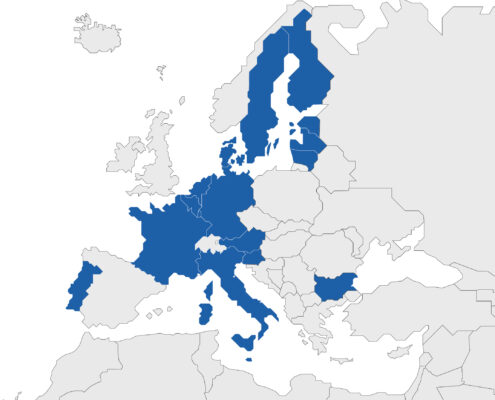European patent law reform entered into force on June 1, 2023
The European patent law reform entered into force on June 1, 2023. The reform includes the creation of a Unified Patent Court and European patents with unitary effect.
In the following we would like to inform you about the effects of the reform on European patent law:
Patents
A European patent (in short: bundle patent) is nationalised in the designated contracting states of the European Patent Convention (EPC) after it has been granted, so that it has effect in these contracting states. The European patent thus “disintegrates” into a bundle of individual nationalised patents. The contracting states to the EPC are the member states of the EU and eleven other states.
European patents with unitary effect (in short: unitary patent), on the other hand, offer uniform protection and have the same effect in all EU member states participating in the reform. In terms of enforcement, it is therefore no longer necessary to bring actions in the individual countries. However, a unitary patent can also be challenged uniformly. As things stand, not all EU Member States are participating in the reform. A list of the EU Member States participating in the reform can be viewed at the end of the article.
The bundle patent and the unitary patent are both filed as European patent applications at the European Patent Office (EPO). The examination procedure before the European Patent Office is the same. The decision to register a European patent application as a unitary patent or as a bundle patent can be taken up to grant. It is possible to register a European patent application as a unitary patent and to have the bundled patent additionally nationalised in other contracting states of the EPC which do not participate in the reform. A bundle patent already granted cannot be extended to a European patent with unitary effect.
Costs: If a bundle patent is nationalised in four contracting states participating in the reform, the renewal fees for a unitary patent may be cheaper than those for the bundle patent. Please note that for a bundle patent, additional translations of varying extent may be required depending on the contracting state. For a unitary patent, on the other hand, only a full translation into English is required for a German- or French-language European patent application, or a full translation into an official language of an EU member state for an English-language European patent application.
The decision whether a European patent application should be registered as a unitary patent or as a bundled patent with nationalisations in different countries cannot be answered uniformly. Each European patent application must be weighed up separately.
Jurisdiction
The Unified Patent Court shall have exclusive jurisdiction over unitary patents. The unitary patent can be uniformly enforced and challenged before the Unified Patent Court. Decisions of the Unified Patent Court relating to a unitary patent apply to the scope of the unitary patent, i.e. in all EU Member States participating in the reform.
The Unified Patent Court has also jurisdiction over bundle patents, irrespective of their date of grant, which have effect in at least one EU Member State participating in the reform. However, the jurisdiction of the Unified Patent Court is limited to these member states only. Thus, a bundle patent can be uniformly enforced and challenged before the Unified Patent Court, so that decisions of the Unified Patent Court are valid in the EU Member States participating in the reform in which the bundle patent has effect.
By means of an opt-out declaration, the jurisdiction of the Unified Patent Court can be excluded for a bundle patent irrespective of its date of grant, so that – as before – it can still only be enforced and challenged before the respective national courts.
The decision whether the jurisdiction of the Unified Patent Court should be excluded for a bundle patent by means of an opt-out declaration cannot be answered uniformly. An individual decision must be made for each European patent.
EU Member States participating in the reform
The EU Member States participating in the Unitary Patent and the Unified Patent Court must ratify the Agreement. The participating EU Member States are listed below:

Source: European Patent Office; URL: https://www.epo.org/applying/european/unitary/unitary-patent_de.html
Ratification carried out
- Belgium
- Bulgaria
- Denmark
- Germany
- Estonia
- Finland
- France
- Italy
- Latvia
- Lithuania
- Luxembourg
- Malta
- Netherlands
- Austria
- Portugal
- Sweden
- Slovenia
Ratification pending
- Greece
- Ireland
- Romania
- Slovakia
- Czechia
- Hungary
- Cyprus
Other EU Member States:
- Croatia: joined the EU after the signature and has not yet expressed its views on participation and signature.
- Poland: participated but did not sign the agreement .
- Spain: has neither participated in nor signed the agreement
